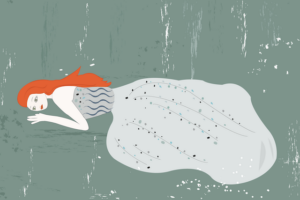How one can Discover Your Ikigai (and Extra Function and Pleasure)


“All of us have two lives. The second begins after we understand that we solely have one.” ~Confucius
In line with Gettysburg School, the typical individual will spend 90,000 hours working of their lifetime. For many people, plainly the reply to Mary Oliver’s well-known query, “What’s it you propose to do along with your one wild and treasured life?” is figure. So why accomplish that many people keep in jobs we don’t get pleasure from?
For 3 years, I had a job that made me really feel stressed and disengaged. On paper, it was the best match. It aligned with my expertise in training administration, an trade I fell into by means of a mutual good friend in faculty. However in actuality, the tradition on the firm made it troublesome for me to really feel snug there or have any life outdoors of labor.
After I was on the clock, it was continuously go, go, go. I used to be anticipated to work a number of weekends within the fall, summer time, and spring, generally from dwelling and generally touring for conferences. I typically labored early mornings and late evenings for a superb, however not nice, wage (I labored for a nonprofit), and there was no additional time.
Due to this, I used to be extraordinarily guarded about my few free weekends, preferring to make use of them to recharge quietly at dwelling. I felt resentful when a member of the family or good friend would ask me to go to, feeling so burnt out from my day-to-day that I had nothing left to offer them.
My coworkers occasionally took paid day off, and generally they have been denied. I as soon as requested to take a Friday off for a detailed household good friend’s marriage ceremony and was informed it wouldn’t be possible. I spent the five-hour automotive journey to the venue working from the passenger seat.
I frustratedly turned my telephone off on the rehearsal dinner, which was at 8:00 p.m. on Friday, after receiving a message from my boss. After I did get to take day off, I used to be typically requested to get on-line or assist my boss out over the telephone. I heard from her whereas on the seashore for a good friend’s bachelorette journey, in a rental for a household trip, at my aunt and uncle’s home for Thanksgiving, and even in a distant mountain city in Italy.
I began googling issues like “tips on how to fight burnout,” “what to do if you happen to don’t like your job,” “how do I hold working additional time however not really feel like ice cream on a ninety-degree day?” and “does my canine nonetheless love me simply as a lot if I don’t have time to play with him each morning?” By some means, in one in all my Google spirals, I got here throughout the idea of “Ikigai.”
A Japanese philosophy that means “motive for being,” Ikigai encompasses discovering achievement within the intersection of what you like, what you might be good at, what the world wants, and what you could be paid for.
It asks, “Why do you stand up within the morning?” and means that your profession needs to be the reply if you happen to’re residing your Ikigai. Not solely was my job not the explanation I awakened within the morning (that honor goes to my two-year-old golden doodle, Nemo), however it was additionally the explanation I hit snooze and rolled again below the covers to cover from the day for a bit longer.
So I stop. It wasn’t so simple as that—it took loads of work and fairly a little bit of luck, however I ended up redirecting to a brand new path that matches my way of life a lot better. When serious about why I stand up within the morning, studying was one of many first issues to come back to thoughts—I devour a number of books per week, and nothing makes me happier than a number of quiet hours with a espresso and written phrases—so editorial work felt like an encouraging place to begin.
Now, I work as an editorial supervisor for a small firm solely two miles from my home. I’m doing work that I get pleasure from with individuals who I like, and I by no means work weekends. I’m undecided but if I’ve discovered my Ikigai, however my present work permits me to discover what I really like whereas permitting me time to domesticate hobbies and provides some thought to what I genuinely get pleasure from.
I’m not alone in my eager for goal and my have to comply with a profession path that matches me. A 2021 Gallup report discovered that 60% of millennials and 57% of Gen Z are open to new job alternatives, with a good portion saying that their major driver is the need for significant work.
Not like many boomers, who worth monetary safety above all else, younger individuals at present usually tend to go away jobs that don’t present a way of goal or alternatives for private development. A 2019 examine by MetLife discovered that 74% of boomers thought-about monetary safety and advantages to be probably the most vital elements in a job, in comparison with solely 54% of millennials.
In our tradition, we’re anticipated to decide on a profession in our early twenties, earlier than we all know something concerning the world or ourselves, and climb the identical ladder ceaselessly, looking for status and monetary acquire. However that customary is altering.
Younger individuals are selecting to go away their jobs to pursue their goals, whether or not which means pivoting to a brand new profession path, going freelance, beginning their very own enterprise, or touring. Like me, they’re unwilling to place up with poor work-life steadiness and work that isn’t significant for them. They search jobs that provide private achievement, align with their values, and supply a way of goal.
How Do You Discover Your Ikigai?
So, how do you discover your Ikigai? It’s not a one-day revelation however a journey of self-discovery. It requires thought, preparation, and reflection. Listed here are 5 steps you’ll be able to take to work in direction of your Ikigai.
1. Put aside time for self-reflection.
Have interaction in self-reflection to grasp your passions, strengths, and values. Instruments like journaling or character assessments can assist make clear what drives you.
Use journaling prompts like these:
What actions make you lose monitor of time?
What do individuals typically ask on your assist with?
What are your strengths and abilities?
When have been you the happiest, and why?
2. Experiment.
Attempt completely different actions, volunteer, or tackle aspect tasks to discover your pursuits and see what resonates with you. Some trial-and-error could also be obligatory to collect insights into what fulfills you.
Listed here are some choices you’ll be able to discover:
Tackle new hobbies or volunteer roles.
Attend free workshops or group occasions.
Collaborate on tasks that curiosity you.
Be part of an curiosity group in your group.
3. Set objectives and make plans.
Think about your passions and strengths and use them to develop actionable objectives. Create a roadmap with clear steps to succeed in these objectives. Setting particular objectives will improve your motivation for change and offer you one thing to work towards and look ahead to.
Attempt setting SMART objectives. Which means they’re:
Particular
Measurable
Achievable
Related
Time-Sure
4. Search suggestions.
Ask mentors, friends, or professionals in your areas of curiosity for suggestions. Speaking to the individuals who know you finest can provide you insights into components of your self that you could be not have seen, together with what lights you up. Speaking to individuals who know the trade you’re excited by can assist you determine if it’s best for you earlier than you pivot solely in that new route.
Think about the next options:
Ask your family and friends about their perceptions of your strengths and passions.
Ask your boss at work what they really feel you do finest and what you appear to get pleasure from.
Search casual mentors who can provide recommendation and steering.
5. Embrace steady studying.
Decide to lifelong studying by means of programs, studying, and different instructional actions. Staying curious and open to new data can assist you adapt and thrive in your pursuit of goal.
The next books have been useful to me as I’ve seemed for my goal:
Ikigai: The Japanese Secret to a Lengthy, Comfortable Life by Héctor Garcia and Francesc Miralles
Braving the Wilderness: The Quest for True Belonging and the Braveness to Stand Alone by Brené Brown
Factor Once more: The Energy of Figuring out What You Don’t Know by Adam Grant
Further Philosophies for a Comfortable Life
Ikigai, at its core, is the seek for contentment. As you’re trying to find your Ikigai, a number of different philosophies can assist you discover achievement in your day by day life:
Hygge is a Danish idea that, in response to Nation Residing, “encompasses a sense of cozy contentment and well-being by means of having fun with the straightforward issues in life.” Hygge emphasizes making a heat environment. It’s about discovering happiness in on a regular basis moments and fostering group and togetherness.
Lagom is a Swedish philosophy that interprets to “not too little, not an excessive amount of, good.” Lagom encourages a balanced, sustainable way of life and making aware selections that result in contentment with out extra. It’s about discovering concord and satisfaction by means of simplicity.
Friluftsliv interprets to “open-air residing” and is a Norwegian idea that celebrates out of doors life and nature. Friluftsliv emphasizes the significance of spending time in nature for psychological and bodily well-being. It encourages out of doors actions and connecting with the pure surroundings as a supply of pleasure, rest, and a way of goal.
Remaining Ideas
I’ve seen firsthand what number of younger individuals, me included, are more and more leaving conventional jobs in quest of extra fulfilling and versatile careers, fueled by the grind of poor job high quality and the eager for private {and professional} development. Embracing ideas like Ikigai has been transformative for me, and it can be a superb reminder for others.
By actively looking for our goal and utilizing methods to seek out what really drives us, we are able to navigate our profession paths with higher readability and pleasure. This journey isn’t nearly discovering a job—it’s about making a life that resonates with us and what we worth most. In any case, we solely have one life.
About Norrie Seaside
Norrie Seaside is a contract author and blogger who’s captivated with psychological well being and residing a significant life. She is all the time looking for to enhance herself and others, and he or she notably loves writing about profession achievement, cultural traits, and making an impression.






